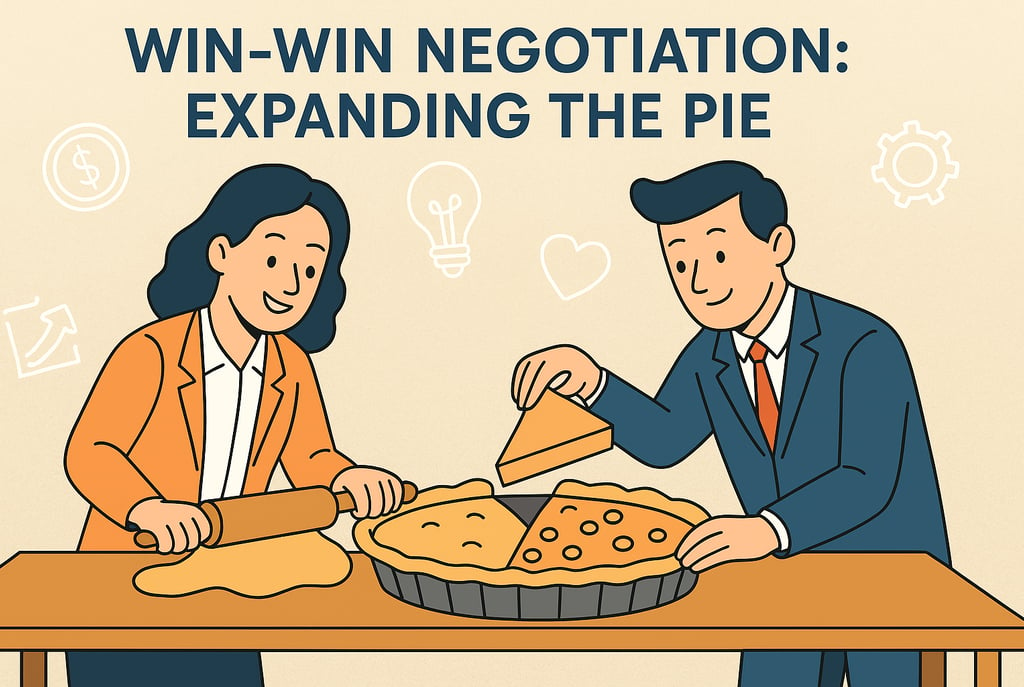Win-Win Negotiation – Expanding the Pie
Discover how creative, win-win negotiation strategies can unlock hidden value and build better deals in business, sales, and daily life. Go beyond the obvious to find additional value for both parties.
NEGOTIATION STRATEGIESPRINCIPLED NEGOTIATIONRELATIONSHIPSNEGOTIATION SKILLSPERSUASIVE NEGOTIATIONWIN-WIN NEGOTIATIONGETTING TO YESART OF NEGOTIATION
Ashish Mendiratta
5/22/20256 min read


Win-Win Negotiation – Expanding the Pie isn't just a concept—it’s the skill that transform how we approach every high-stakes conversation.
Let me tell you about the day I almost blew a million-dollar opportunity—not because I didn’t push hard enough, but because I pushed too hard in the wrong direction. I treated the conversation like a tug-of-war. The harder I pushed, the more the other side resisted. And it almost fell apart—until something unexpected happened.
We stopped tugging.
We started building.
That shift—away from competing and toward creating—taught me one of the most powerful lessons of my professional life: real negotiation isn’t about fighting for a bigger slice of the pie. It’s about making the pie bigger.
Let me take you inside that journey.
Stay Connected for more Insights
1. Negotiation as War: Old Way of Thinking
For years, I thought negotiation meant getting as much as you can without giving up more than you must. I imagined it like a chess game—or worse, a battlefield.
I learned it young. When I bought my first car, my dad coached me: “Never show you want it. Lowball them. Walk away if you have to.” At my first job, a manager told me, “If they don’t walk away fuming a little, you gave too much.”
And for a while, that approach worked. Or so I thought.
But here’s the catch: I often left the table exhausted, suspicious, and a little hollow. The other side wasn’t eager to work with me again. Deals closed—but the relationships? They cracked.
And the value left on the table? I didn’t even know how much I was missing.
2. The Shift: Discovering Win-Win Thinking
Everything changed the day I attended a negotiation workshop led by an ex-diplomat who'd worked on Middle East peace talks. His first words?
“Most people think negotiation is about claiming value. It’s not. It’s about creating it.”
He explained the concept of expanding the pie—finding hidden value that satisfies both sides’ interests in unexpected ways. Not compromise, not concession. Creation.
I sat there stunned. Why had no one taught me this sooner?
It felt like someone had handed me a new lens—not just for negotiation, but for collaboration, business, and even relationships.
3. Behind the Idea: What Does “Expanding the Pie” Really Mean?
Imagine you're splitting a cake with someone. You both want the biggest piece. The traditional way? Argue over whose slice is fair. But what if you ask, “Can we bake another cake?” or better yet, “Can we add ice cream and make this a dessert bar?”
That’s expanding the pie.
In negotiation terms, it means:
Discovering interests, not just positions.
Finding elements of value beyond money: time, convenience, prestige, access, flexibility.
Creating options that meet both sides’ core needs—even if they look different than expected.
4. A Real Example: SpiceJet and Jaisalmer Win-Win Negotiation during a Crisis
This real life case was published in Ivey Publishing (SpiceJet and Jaisalmer: A Win-Win Negotiation during a Crisis by Priyanka Vallabh, Suresh J, Ashish Modi)
Tourism drives nearly 60% of Jaisalmer’s economy, but in 2020, the city was hit hard. The cancellation of the iconic Desert Festival and a 69% drop in tourist arrivals due to COVID-19 pushed Jaisalmer into economic crisis.
At the time, SpiceJet was the only airline operating flights to Jaisalmer. Its potential withdrawal would have severed the city’s vital connection to the rest of the country—jeopardizing jobs, livelihoods, and local businesses.
That’s when I Love Jaisalmer community stepped in with a bold and unprecedented idea: India’s first Citizen–Airline Partnership. Rallying local citizens, stakeholders, and the District Administration, the initiative aimed to mitigate operational risk for SpiceJet and ensure the route remained viable.
In just 15 days, the team mobilized support, pooled resources, and signed a Memorandum of Understanding (MoU)—keeping the skies open and kickstarting the city’s tourism revival.
The collaboration became a landmark example of creative crisis negotiation and public-private partnership. It was later documented as a business case study by Ivey Publishing, titled:
“SpiceJet and Jaisalmer: A Win-Win Negotiation During Crisis.”
5. Creativity is a Negotiation Superpower
The biggest lever in expanding the pie is creativity.
I was once negotiating a consulting contract with a client who said, “We can’t afford your full rate.” My old instinct would've been to push back—or walk away. But I asked instead:
“What’s important to you besides the price?”
They said:
Speed. They needed it done in 3 weeks.
Referrals. They wanted someone they could recommend to partners.
That opened the door.
I offered:
A 10% discount for a fast-track timeline (which I could handle).
A revenue share on any business they referred.
They agreed immediately. That deal ended up earning me more than if I’d stuck to my original rate. And it brought me two new clients.
Here’s the secret: Most negotiations fail not because there’s no deal—but because both sides stop at obvious options.
That’s why brainstorming without judgment—yes, even the “crazy” ideas—can unlock gold.
6. Ask Better Questions
If you want better outcomes, stop making demands. Start asking smarter questions.
Try:
“What else matters to you in this deal?”
“What would make this a home run on your side?”
“If we had total freedom, how else could we structure this?”
Once, in a licensing negotiation, I asked a hesitant partner, “What’s the risk you’re trying to avoid?” They admitted it was reputational. So we added a clause and shared messaging rights. Problem solved.
Questions uncover the real game being played.
7. What Gets in the Way?
Let’s be honest: it’s not always easy to think creatively under pressure. These are the biggest roadblocks I’ve seen (and experienced):
Ego: Needing to “win” can blind you to better options.
Scarcity mindset: Believing there’s only so much to go around.
Fear: Worrying the other side will take advantage of your flexibility.
Mistrust: If you think they’ll lie or bolt, you won’t share ideas.
In one negotiation, I refused to offer a concession because I didn’t trust the other party. They mirrored my resistance. The deal tanked. Months later, we met again, more open. In 20 minutes, we built a deal that worked better than the original one ever could have.
Lesson? Reciprocity - Transparency invites transparency.
8. Trust: The Real Force Multiplier
You can’t expand the pie if no one trusts you enough to bake with you. Trust doesn't mean naivety. It means consistency, clarity, and care.
Here’s a rule I live by: If you wouldn’t feel comfortable honoring your side even if it wasn’t legally binding, don’t offer it.
A web designer I once hired exceeded expectations. I gave her more than we agreed on. Years later, when I needed branding help again, she dropped two clients to work with me.
Trust builds equity. Not just in deals—but in people.
9. The Long Game: Negotiation Isn’t One-Off
Some of my best opportunities came from people I negotiated well with years earlier.
There’s a myth that being generous weakens your leverage. In reality, how you negotiate shapes your reputation.
I’ve been referred, promoted, and offered partnerships simply because someone remembered I handled a tough conversation with grace and creativity.
Negotiation isn't a finish line. It’s the foundation of a future.
10. The Framework: How to Expand the Pie
Here’s my go-to playbook:
Prepare interests, not just demands. What do you really want? What are your nice-to-haves?
Uncover their interests. Ask, listen, clarify.
Brainstorm options. No pressure, just possibilities.
Create MESOs (Multiple Equivalent Simultaneous Offers). Show 2-3 packages that meet their needs in different ways.
Trade low-cost, high-value items. What’s easy for you but valuable to them?
Listen actively and show flexibility. Pay attention to how they respond to your offers. Be flexible to modify or reframe your offers.
Build from curiosity, not assumptions. Assume there’s more value to be found.
Package the deal. Don’t just split issues—combine them into a win.
Final Thoughts: A Challenge for You
Next time you face a negotiation, ask yourself:
Am I focused only on winning, or on creating?
Have I explored all the ways to make this deal better for both of us?
Can I step back from positions and see the interests underneath?
Try this with:
Your boss on a promotion.
Your partner about shared responsibilities.
A client pushing back on price.
A friend planning a vacation with you.
You’ll be surprised how often you can make a better deal—together.
So, next time you’re at the table, don’t just fight for a bigger slice. Ask: “What can we create that’s better than what either of us came in with?”
That’s how you win. That’s how everyone wins.
Subscribe
Contact:
P2/54 DLF Phase 2 Gurugram 122002
contact@advanchainge.com
+91-9873829286
deepak.nande@advanchainge.com
+91-9820291969


